Many users feel worried when their computer becomes slow or stops working. You may see alerts or apps closing without warning often. These issues are common during low-memory Windows on daily computers. They affect work and even simple browsing tasks at home. However, there are many solutions available to resolve this issue without further damage. This guide explains why it happens and how anyone can fix it with ease.
Try Recoverit to Perform Windows Data Recovery

In this article
Part 1. Understanding Low Memory Alerts on Windows
On Windows, a low memory alert means the system lacks enough working space. It does not mean your storage drive is full or running out. This warning is about RAM, which helps programs run smoothly every day. When RAM fills up, Windows borrows virtual memory from your drive temporarily. The alert appears when both RAM and backup memory are almost full.
Windows then warns you to avoid slowdowns, app closures, or sudden crashes. Common reasons include many open apps, heavy browser tabs, or faulty software. As a result, switching tasks feels harder, and messages ask you to save work. Therefore, understanding these alerts helps you act early and keep systems stable.
Part 2. What Causes Low Memory on a Windows Computer
Many users wonder why warning messages appear while they are using their computers. This part explains why alerts appear when the computer is low on memory situations occur:
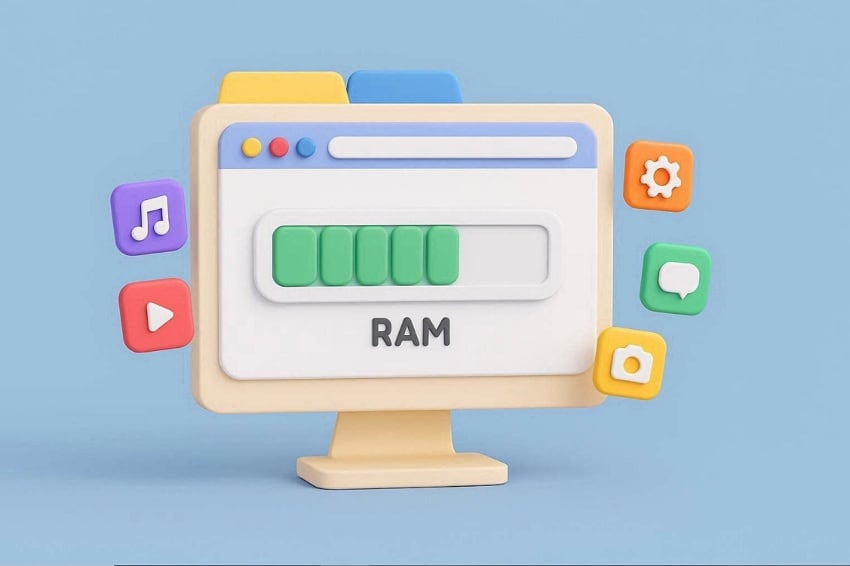
- Many Programs: Running many apps together fills RAM, even when each seems small alone. Combined use grows, pushing memory demand beyond safe system limits over time.
- Low-RAM: Computers with limited RAM reach memory limits more when handling modern workloads. When virtual memory is unavailable, Windows lacks extra space to handle memory demand. If you faced “D Drive is Full but No Files in Windows”, click to learn more.
- System Issues: Faulty drivers can reserve memory, leaving usable space unavailable to running apps. Outdated system files sometimes block full memory access, confusing Windows reports during operation.
- Hardware Faults: Bad RAM modules may cause errors and warnings that mimic shortages. Incompatible memory sets can limit usable capacity, despite higher installed amounts being present.
- Heavy Browsing: Background tools like browsers and security software use memory daily. Over time, their combined demand leaves less memory available for visible programs running.
Part 3. 5 Signs That Your Computer Is Running Low on Memory
Low-memory Windows problems often show clear signs before serious slowdowns or crashes occur. Below are those signs and usage factors that push Windows beyond safe memory limits:
- Frequent Alerts: Your system often displays warnings saying “computer is low on memory”. Even idle programs can trigger these messages, signalling RAM and virtual memory stress.
- Slow Performance: Apps open slowly, Windows lags, and typing often falls behind your keystrokes. Switching between tasks or running multiple programs feels heavy because memory is exhausted.
- Disk Thrashing: The hard drive works as Windows uses virtual memory for overflow. High read/write activity indicates that RAM cannot handle running programs.
- Program Freezes: Applications freeze or stop responding without warning during normal computer use. Some memory-intensive apps may close, reflecting system strain on resources.
- Delayed Startup: Booting Windows takes longer, and startup programs appear one by one. System login and desktop load times increase, showing early signs of memory shortage.
Part 4. Windows Low Memory Error? Step-by-Step Guide to Solve It
When your computer is low on memory, programs may crash or run very slowly. Below are various fixes that help resolve these errors and restore normal performance:
Fix 1. Close Unnecessary Programs and Background Processes
When your system shows low memory, closing unneeded programs frees up RAM. Each running app and background process takes memory, limiting space for active tasks. Heavy or poorly optimized apps gradually consume more RAM, worsening slowdowns over time. Therefore, stopping these processes reduces overall memory usage and prevents low-memory alerts. Background tools like cloud sync and launchers take up space. Take guidance below to stop unnecessary programs and background processes:
- From the “Start” menu, search for “Task Manager” and click the “Open” option.
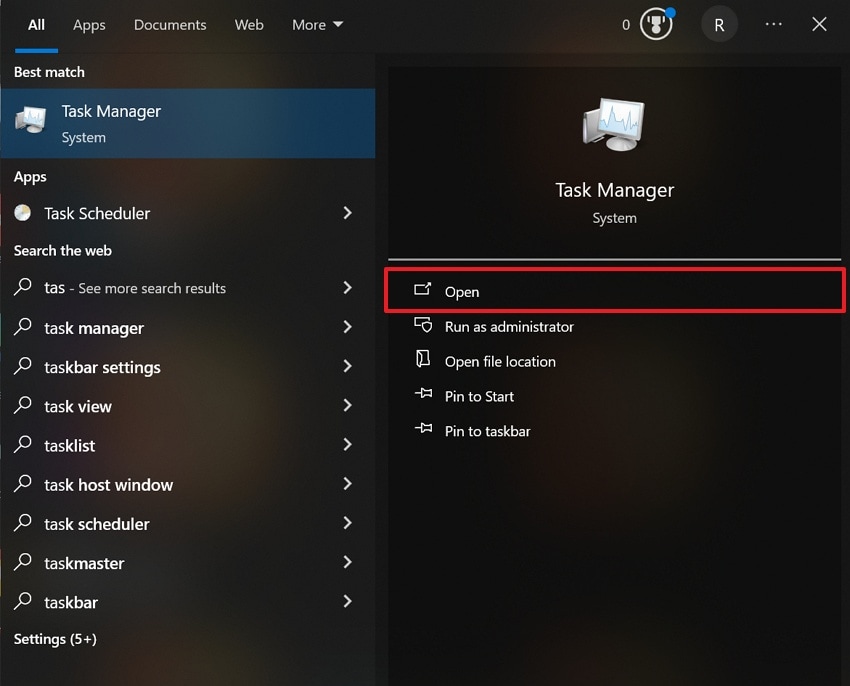
- After accessing it, go to the “Processes” tab and check the apps with high memory usage. Next, right-click that app and opt for the “End Task” option.
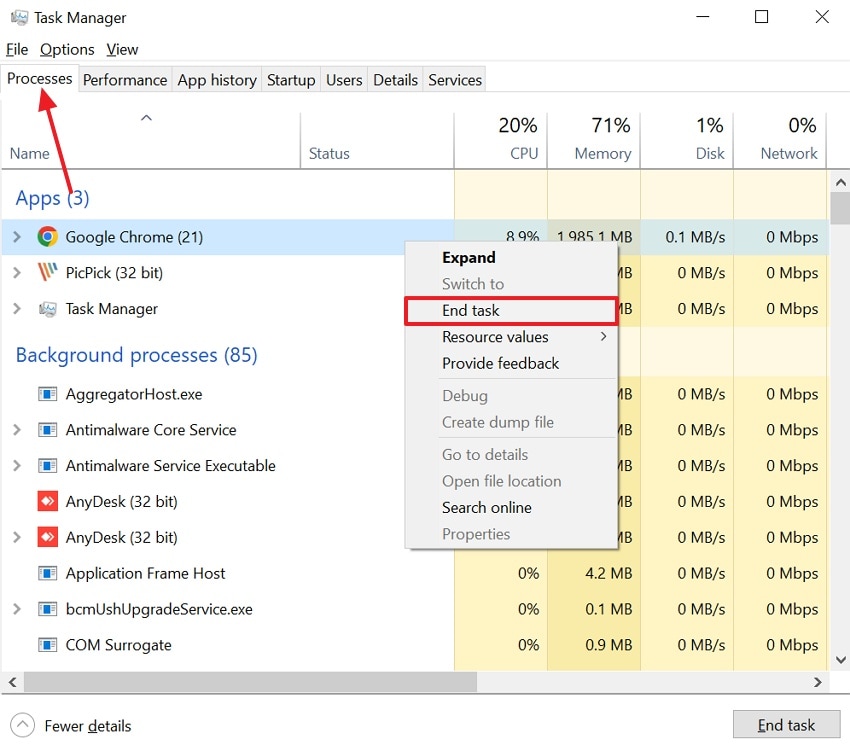
Fix 2. Increase Virtual Memory (Paging File)
Virtual memory uses part of your storage drive when RAM gets full, not when storage is full. This paging file lets Windows move inactive data from RAM to disk. If your computer struggles with low memory Windows, increasing virtual memory can help. It reduces crashes and “out of memory” errors during heavy workloads. Let’s explore the steps below to increase virtual memory:
- To initiate, press “Windows + R” to open the Run dialog box and type “sysdm.cpl” then press “OK.”
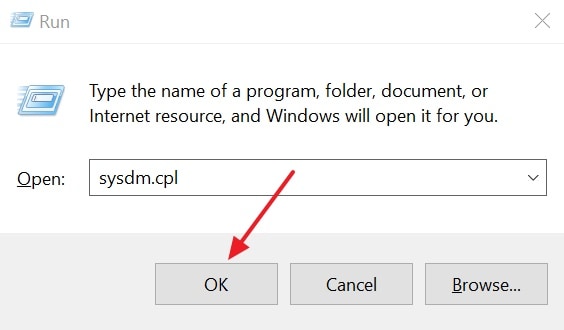
- Upon accessing it, go to the “Advanced” tab and choose “Settings” under the “Performance” section.
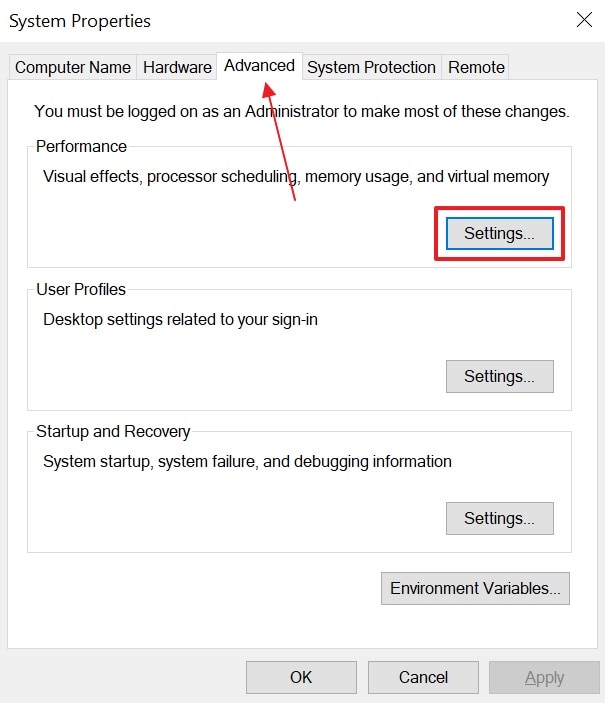
- After accessing it, go to the “Advanced” tab and click the “Change” button.
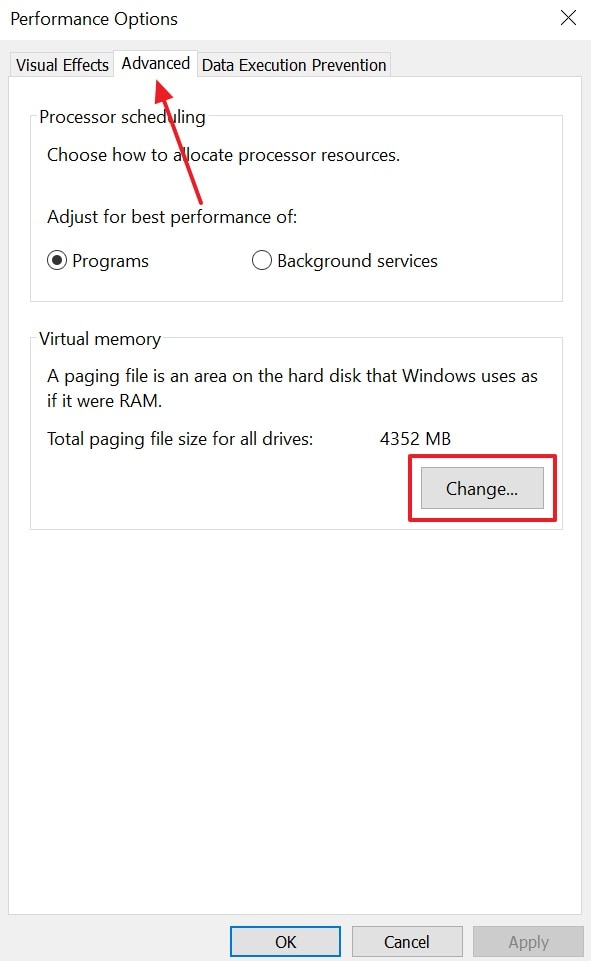
- Uncheck the “Automatically Manage Paging File Size for All Drives” option. Now, enable the “Custom Size” and enter the initial size and Maximum size (1.5–3× your RAM recommended). At last, press the “Set” button, then click the “OK” button to save changes.
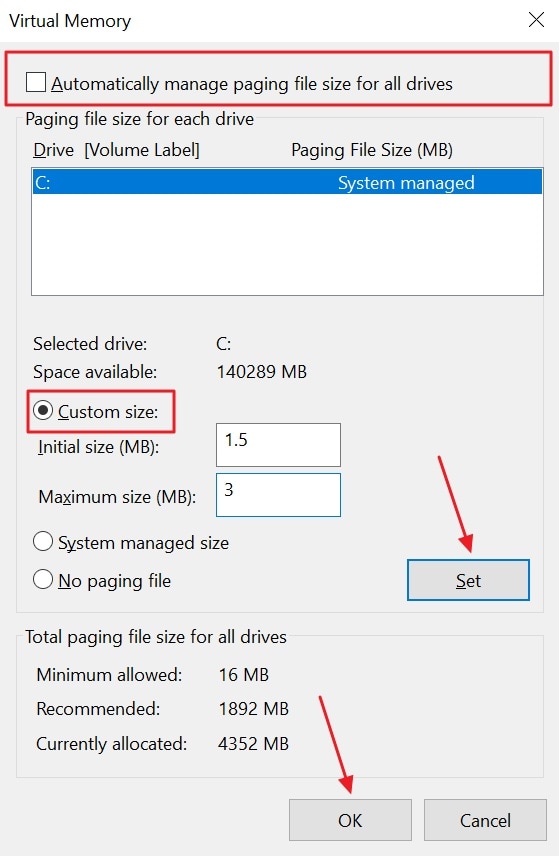
Fix 3. Upgrade RAM for Better Performance
You should upgrade RAM when your computer is low on memory often. More RAM gives Windows extra space, so it does not rely on slow virtual memory. Programs open faster, and using many apps at once feels much smoother and easier.
Windows swaps less to the disk, which reduces freezes, slowdowns, and warning messages. Therefore, extra RAM also lowers hard drive work and keeps your system faster and safer.
Fix 4. Scan for Malware or Unwanted Software
Sometimes, hidden malware or unwanted software consumes your computer’s memory. These programs run background tasks that steadily use RAM and cause low memory warnings. Malware can duplicate itself or inject into system processes, increasing memory use over time. Such hidden tasks slow performance, reduce available memory, and trigger unexpected app crashes. So, adhere to the following guide to scan for malware:
- Press “Windows + S” together and type “Windows Security” in the search bar, then click “Open.”
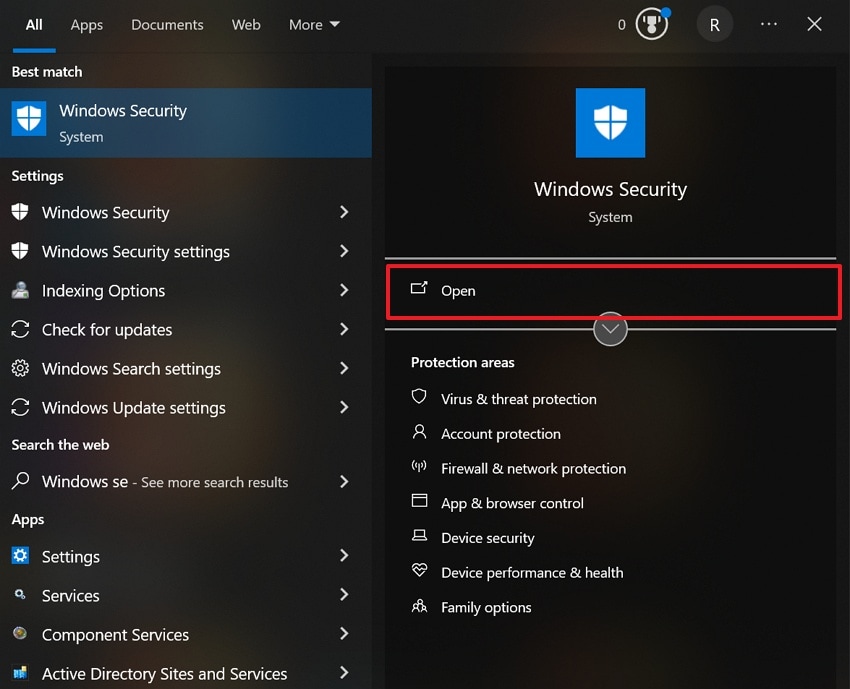
- When you access it, head to the “Virus & Threat Protection” section.
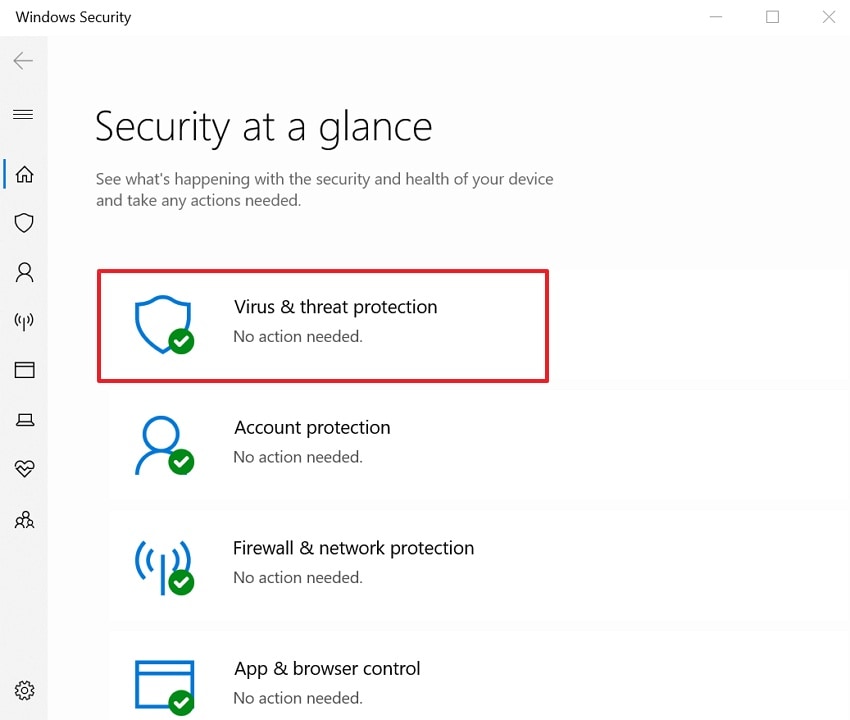
- At last, click the “Quick Scan” button to check your system for common malware.
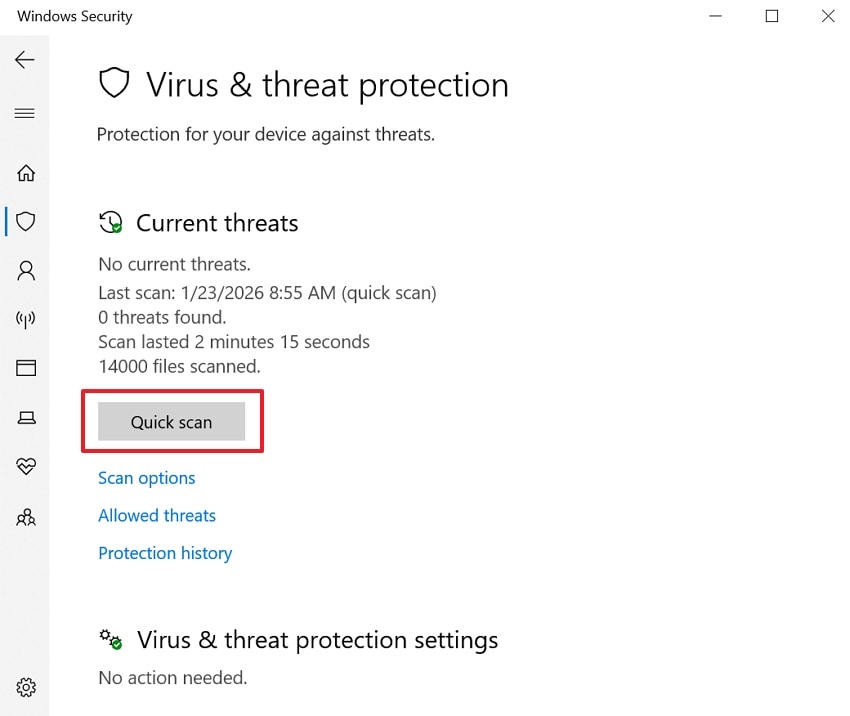
Fix 5. Optimize Startup Programs to Free RAM
Optimizing startup programs can reduce low-memory windows by freeing RAM for active tasks. Many apps load at boot, reserving memory even when unused and slowing the system. Therefore, disabling unnecessary startup programs stops their background services from occupying valuable RAM. Also, it lowers reliance on virtual memory and prevents unexpected crashes. Hence, review the instructions below to optimize startup programs:
Instructions. Access the “Task Manager” and go to the “Startup” tab to see all programs that run at boot. Next, select the program you don’t need at startup and right-click on it and choose “Disable.”
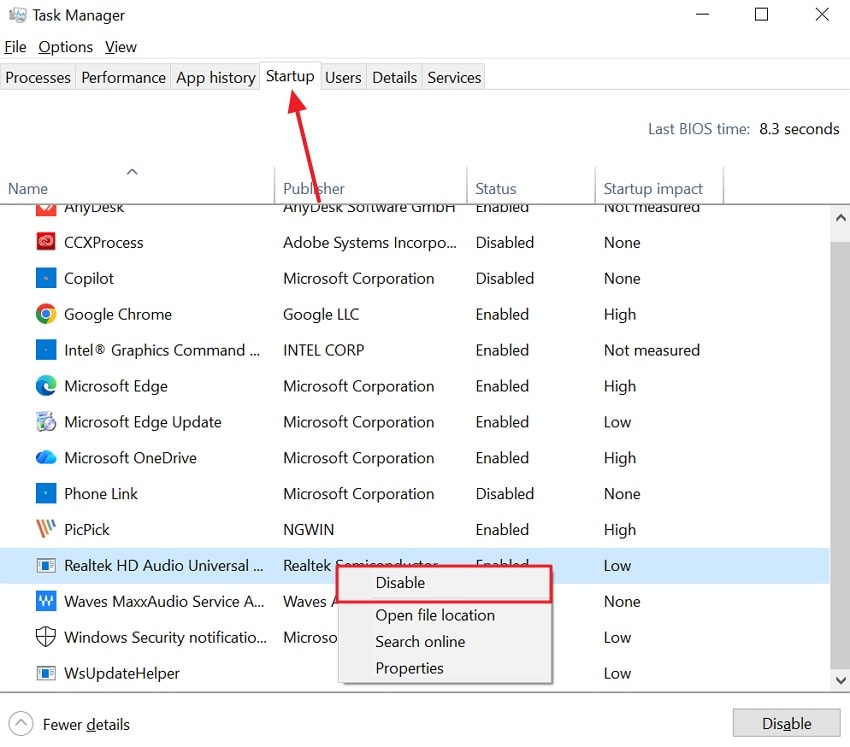
Fix 6. Use the Windows Memory Diagnostic Tool
When the above fixes don't resolve low memory issues, Windows Memory Diagnostic also helps. This tool tests your RAM hardware for errors that often trigger crashes or freezes. However, faulty memory can cause low-memory warnings even when Task Manager shows free space. By identifying defective RAM, you know whether problems are hardware-related or software-based. Thus, go through the guide to use the Windows Memory Diagnostic tool:
- From the “Start” menu, find “Windows Memory Diagnostic” and choose the “Open” option.
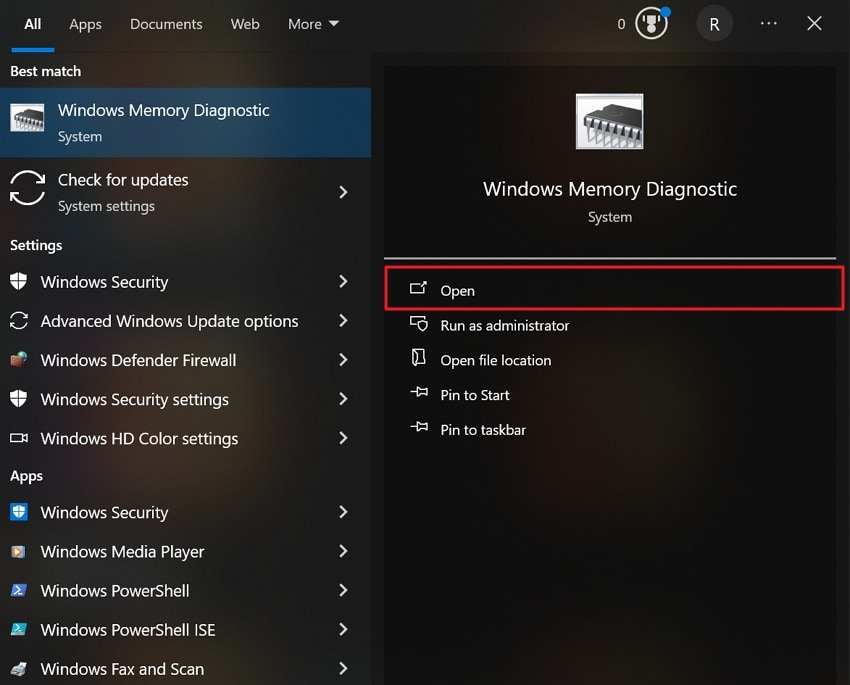
- At last, hit the “Restart Now and Check for Problems” option. Your computer will restart, and the memory test will begin. After completion, Windows will restart and display the results in a notification.
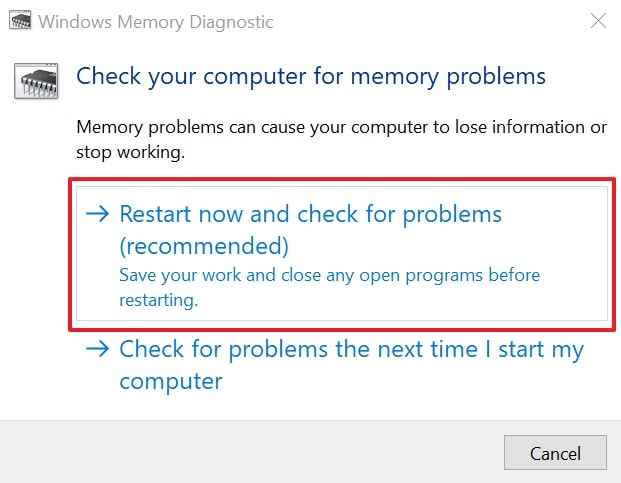
Pro Tip. Recover Lost Data with Recoverit if Memory Issues Cause Crashes
A low memory issue in your computer can also cause sudden crashes during work and the loss of important files. When facing low memory Windows problems, many users want a reliable way to recover their important lost files. To address this need, Recoverit is an ideal option as it uses AI technology to recover recognized lost files. You can recover more than 1000 file formats, including media, document, and archive.
The tool performs a deep scan in 5 minutes and obtains a 99.5% success rate of recovery. Plus, it performs file recovery without overwriting or modifying existing files on storage. Recoverit ensures no further damage occurs while recovering files from low-memory Windows. Users can recover data from 1 million+ storage devices, including HDD and USB drives. It maintains 100% file security while allowing free 500MB data recovery from defined sources.
Key Features
- Recycle Bin Recovery: Restores files emptied from the Recycle Bin or deleted bypassing it.
- Logical Drive Damage: Restores files when partitions, FAT, or MBR structures are corrupted or unreadable.
- Software Failure: Recovers files corrupted due to system crashes or application errors.
Comprehensive Guide to Recover Lost or Deleted Files Using Recoverit
Let’s explore the steps below to restore data with ease without further loss:
- Select a Hard Drive Location
When you access the tool, go to the “Hard Drive and Location” section to choose a location where your files were lost.
- Scanning the Selected Drive
The tool will run a quick scan to get lost files, and you can view the results in real-time.
- Preview Lost Files and Recover
You can now preview the lost files and then opt for the “Recover” button to restore them. At last, you should download the recovered files to your PC.
Part 5. Preventing Low Memory Problems in the Future - 5 Tips
When your computer often shows low memory warnings, preventing these issues becomes essential. This section explains some habits you may apply to avoid low-memory problems:
- App Management: Close useless apps and browser tabs to improve system speed. However, running fewer programs together prevents RAM from reaching critical low memory levels.
- Malware Scan: Always scan for viruses or malware that consume memory and slow performance. Malicious software also triggers low memory alerts and affects Windows stability.
- Windows Updates: Always update Windows and computer drivers to solve memory management problems. Plus, outdated software can cause memory leaks or improper handling of RAM usage.
- Virtual Memory: Maintain virtual memory or set size around 1.5–3× installed RAM. Proper paging file size ensures Windows has backup memory when physical RAM fills.
- Startup Control: Disable useless startup programs to stop them from consuming memory. As a result, it allows you to manage which apps launch during system boot.
Conclusion
To conclude, low memory problems can slow your computer, interrupt work, and cause unexpected crashes. Understanding causes, signs, and fixes helps keep systems stable and responsive longer. With proper habits, most low-memory Windows issues can be avoided. However, crashes can still cause file loss during low memory situations. Therefore, having a trusted recovery option becomes necessary. Recoverit helps restore lost files safely and quickly when unexpected memory failures happen.
FAQ
1. What is low memory in Windows?
When the RAM and the virtual memory have been almost depleted, there is low memory. It restricts the efficient and fast execution of various programs in the system. Windows shows warnings to avoid crashes or data corruption during memory shortages.2. Why does my computer slow down suddenly?
Slowdowns occur when there is over usage of RAM, which cannot support the programs in motion. Background processes, heavy browser tabs consume memory, and there is not much left to do. Low memory warnings indicate the system struggles to manage active application demands.3. Can too many browser tabs cause low memory?
Yes, multitasking by having numerous tabs on the computer occupies much RAM at the expense of other applications. Even idle tabs continue to use memory and affect system performance together. Closing unnecessary tabs frees up storage and prevents frequent low memory alerts.4. How can I recover data without causing more damage?
Recoverit restores lost files without overwriting or modifying existing storage contents. It works on low-memory Windows systems and ensures no further data corruption occurs. Using professional recovery software prevents accidental permanent loss from memory-related crashes.
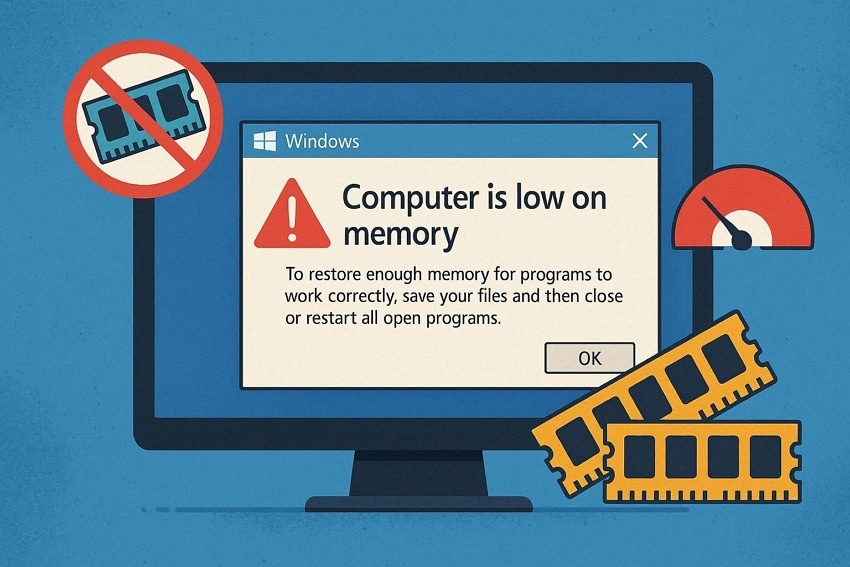



 ChatGPT
ChatGPT
 Perplexity
Perplexity
 Google AI Mode
Google AI Mode
 Grok
Grok






















